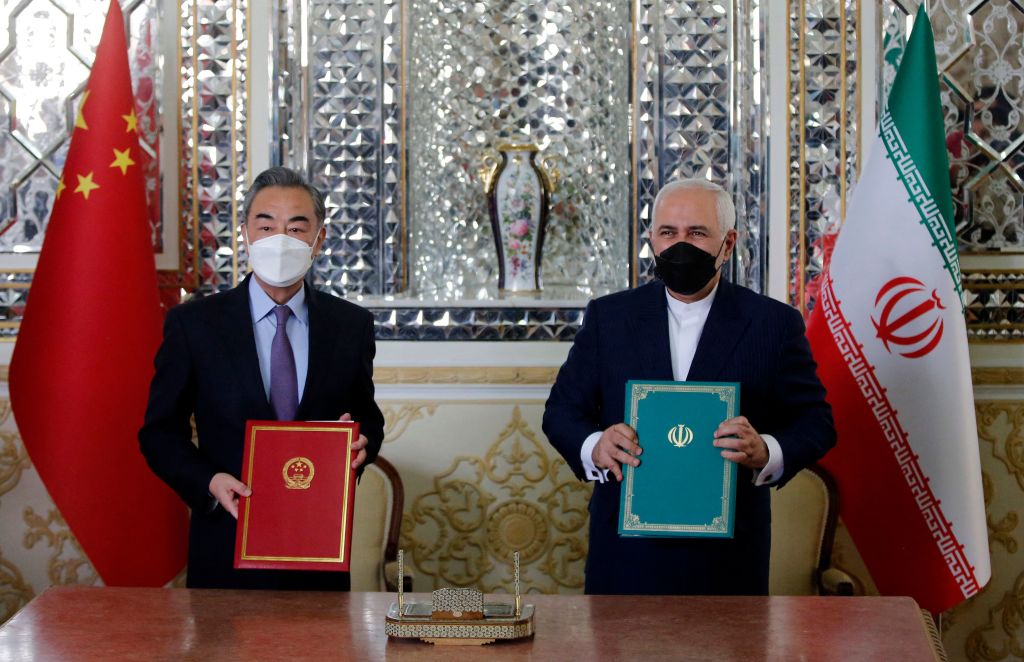Why Iran experts are skeptical about the significance of Tehran's new deal with Beijing


A free daily email with the biggest news stories of the day – and the best features from TheWeek.com
You are now subscribed
Your newsletter sign-up was successful
China and Iran struck a deal on Saturday that will last for 25 years. On the surface it seems meaningful; in exchange for a steady supply of oil, Beijing agreed to invest $400 billion in Iran, The New York Times reports. But there's skepticism among Middle East experts about whether it actually signals a significant new phase in Tehran-Beijing relations.
Dina Esfandiary, a senior adviser at the International Crisis Group and co-author of a book about Iran's relations with China and Russia, told The Wall Street Journal the pact "allows Iran to be a little more intransigent," which could make "Europe and the U.S. a little more nervous because it looks like Iran may have a way out of economic strangulation." But she also tweeted that while it may be a "political and rhetorical win" for Iran, "it doesn't change much in its dealings with China for now." Esfandiary said she concurred with Esfandyar Batmanghelidj, the founder of the think tank Bourse & Bazaar and a visiting fellow at the European Council on Foreign Relations, who argued the $400 billion figure is "completely made up" and "illogical."
In a Bourse & Bazaar article published in September, Jacopo Scita, a doctoral fellow at the U.K.'s Durham University, wrote that the $400 billion figure — which is not included anywhere in the official text of the public agreement — came from an unreliable source, reasoning "the pattern of China-Iran trade" suggests such an investment was implausible. It's worth noting, however, that the Times is reporting $400 billion would be invested over the full 25 years, while Scita writes the source claimed the investment would take place over the first five years of a 25-year plan.
The Week
Escape your echo chamber. Get the facts behind the news, plus analysis from multiple perspectives.

Sign up for The Week's Free Newsletters
From our morning news briefing to a weekly Good News Newsletter, get the best of The Week delivered directly to your inbox.
From our morning news briefing to a weekly Good News Newsletter, get the best of The Week delivered directly to your inbox.
Either way, Batmangehlidj doesn't think the agreement, which other scholars agree is "vague" and "aspirational," should be overestimated, even if it is "geopolitically significant." "The framing that Iran is pursuing a unique relationship with China, that opens it to dependency, is incorrect," Batmangehlidj tweeted.
A free daily email with the biggest news stories of the day – and the best features from TheWeek.com
Tim is a staff writer at The Week and has contributed to Bedford and Bowery and The New York Transatlantic. He is a graduate of Occidental College and NYU's journalism school. Tim enjoys writing about baseball, Europe, and extinct megafauna. He lives in New York City.
-
 6 of the world’s most accessible destinations
6 of the world’s most accessible destinationsThe Week Recommends Experience all of Berlin, Singapore and Sydney
-
 How the FCC’s ‘equal time’ rule works
How the FCC’s ‘equal time’ rule worksIn the Spotlight The law is at the heart of the Colbert-CBS conflict
-
 What is the endgame in the DHS shutdown?
What is the endgame in the DHS shutdown?Today’s Big Question Democrats want to rein in ICE’s immigration crackdown
-
 Rubio boosts Orbán ahead of Hungary election
Rubio boosts Orbán ahead of Hungary electionSpeed Read Far-right nationalist Prime Minister Viktor Orbán is facing a tough re-election fight after many years in power
-
 Key Bangladesh election returns old guard to power
Key Bangladesh election returns old guard to powerSpeed Read The Bangladesh Nationalist Party claimed a decisive victory
-
 Epstein files topple law CEO, roil UK government
Epstein files topple law CEO, roil UK governmentSpeed Read Peter Mandelson, Britain’s former ambassador to the US, is caught up in the scandal
-
 Iran and US prepare to meet after skirmishes
Iran and US prepare to meet after skirmishesSpeed Read The incident comes amid heightened tensions in the Middle East
-
 EU and India clinch trade pact amid US tariff war
EU and India clinch trade pact amid US tariff warSpeed Read The agreement will slash tariffs on most goods over the next decade
-
 Israel retrieves final hostage’s body from Gaza
Israel retrieves final hostage’s body from GazaSpeed Read The 24-year-old police officer was killed during the initial Hamas attack
-
 China’s Xi targets top general in growing purge
China’s Xi targets top general in growing purgeSpeed Read Zhang Youxia is being investigated over ‘grave violations’ of the law
-
 Panama and Canada are negotiating over a crucial copper mine
Panama and Canada are negotiating over a crucial copper mineIn the Spotlight Panama is set to make a final decision on the mine this summer
